HIGH COLLAGEN
Vegan Boost®
Stimulates the body's own collagen production
For beautiful skin, hair & nails,
firm connective tissue and
healthy joints & bones
HIGH COLLAGEN Vegan Boost®
The innovative plant based supplement that triggers the body to build and use native collagen
Collagen fibers are the central building blocks of all connective tissues. They support and stabilize fibers and tissues. Collagen is found almost everywhere in our body: in the skin, bones, muscles and tendons, in cartilage and in all connective tissues.
Our body produces collagen itself, but collagen formation slows down, already after the age of 20.
The result is brittle nails and hair, dry skin and wrinkles, muscle breakdown, inflexible joints and limited mobility.
To counteract this, it makes sense to support the body with high-quality collagen. HIGH COLLAGEN Vegan Boost® stimulates and promotes the body’s own collagen production. The body can again produce more collagen to fulfil the essential functions.
Collagen is more than a cosmetic product, it works from the inside, holistically on our whole body!
Do yourself something good & help your body to produce more collagen!
Precious ingredients:
HIGH COLLAGEN VeganBoost® is a mixture of amino acids which, together with inducers (vitamin C, Indian pennywort & ginseng), stimulate the human body to produce and use native collagen.
Hyaluronic acid is an additional, natural moisturizer for the skin, strengthens the skin barriers and reduces wrinkles.
VeCollal®
Mimics the profile of human Collagen type-1 and provides the body with all amino acids.
Collagen
Helps to reduce the depth of wrinkles and improves the skin elasticity. It ensures a firm complexion and strong connective tissue.

Hyaluronic Acid
Is a natural moisturizer for the skin, strengthens the skin barrier and reduces wrinkles
Vitamin C
contributes to normal collagen production and skin function
Vegan collagen – Does it exist?
Only humans and animals can produce collagen. However, the body can easily form the necessary collagen itself, if it is sufficiently supplied with good amino acids.
HIGH COLLAGEN Vegan Boost®, contains all amino acids as well as special inducers that stimulates the body’s own collagen production. The mechanism of action of this innovative formulation has been confirmed by various clinical studies.
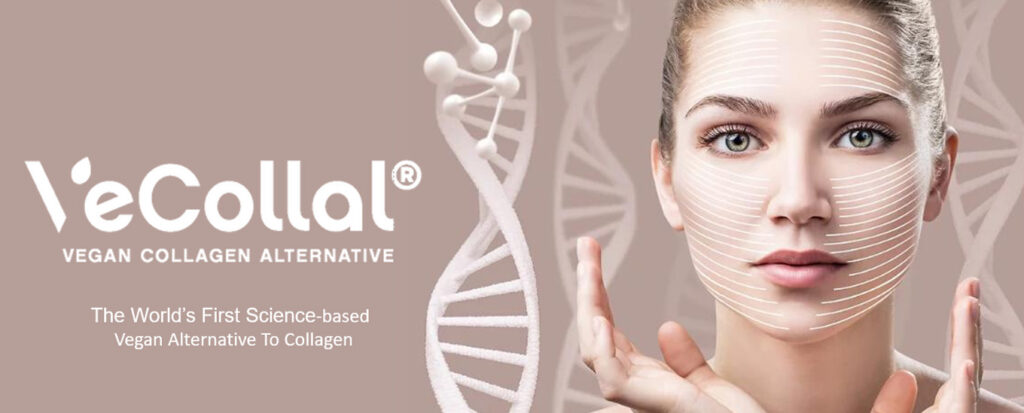
What is VeCollal®?
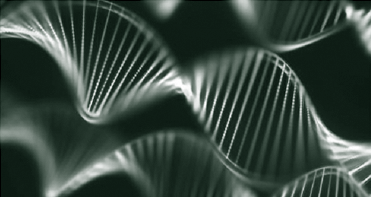
SCIENTIFIC INNOVATION
VeCollal® is the world’s first plant-based (vegan) collagen alternative. based on scientific evidence and inspired by sustainable innovation.
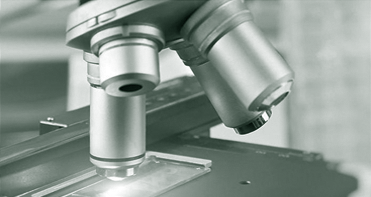
Analysis of human collagen
Developed in collaboration with skin tissue engineer Josué Jiménez Vázquez, PhD, and global private label leader Aminolabs, VeCollal® mimics the human collagen type 1 profile with plant-based ingredients

Vegan, plant-based
VeCollal® was developed with the environment in mind. Sustainable production and plant-based ingredients provide all the benefits of traditional animal-based collagen supplements
Principle of action VeCollal®
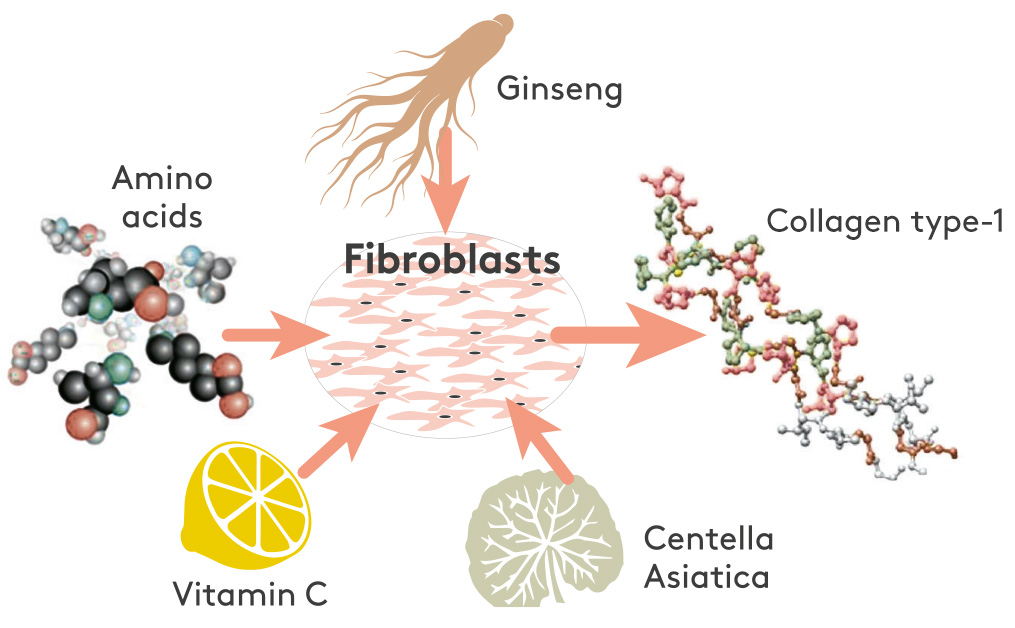
* The principles that form the basis of VeCollal®,
are supported by over 50 studies
HIGH COLLAGEN Vegan Boost® increases the body’s own collagen production, reduces wrinkles, helps the elasticity and hydration of the skin and helps your hair as well as your connective tissue strong and healthy.
VeCollal® provides the body the perfect building blocks for the production of Collagen type-1 by imitating the exact amino acid profile from human Collagen type-1. It can be considered as a biomimetic of Human collagen type-1.
VeCollal® aims to emulate the natural synthesis process for collagen type-1 using vegan analogues.
To ensure these building blocks are used to their best, carefully selected inductors signal the body to use the available amino acids for the production of collagen.*

A unique biomimetic of human Collagen type-1
The VeCollal® contained in HIGH COLLAGEN Vegan Boost® is a unique biomimetic of human collagen type-1. It has exactly the same amino acid profile as the collagen found in human collagen

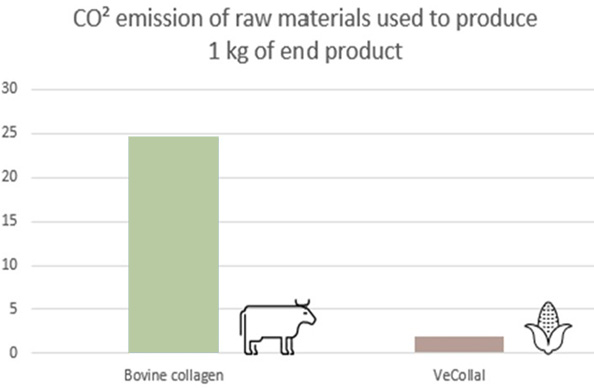
Low carbon footprint and clean Formula
Compared to bovine collagen, the production of VeCollal® has an 8 times lower CO2 emission. VeCollal® is an eco-friendly, sustainable and clean formulation for building collagen, naturally in our body.
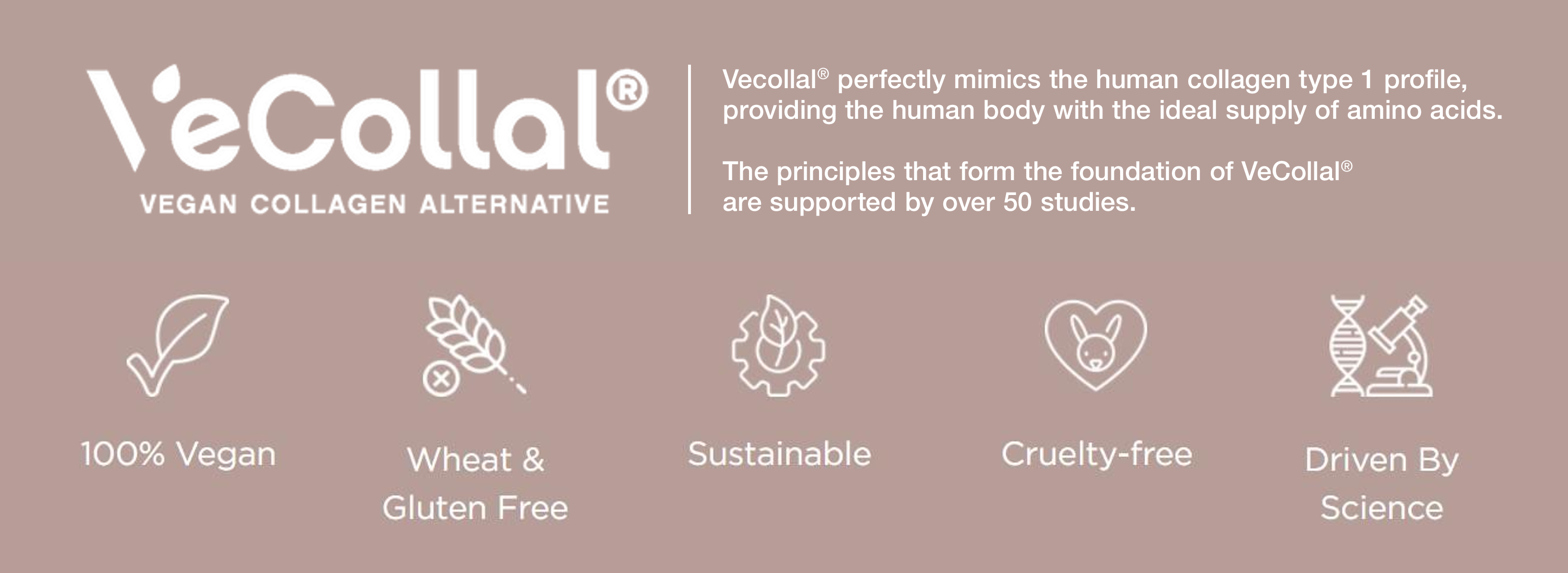
Clinical studies
VeCollal® increases the collagen production by 134,97%
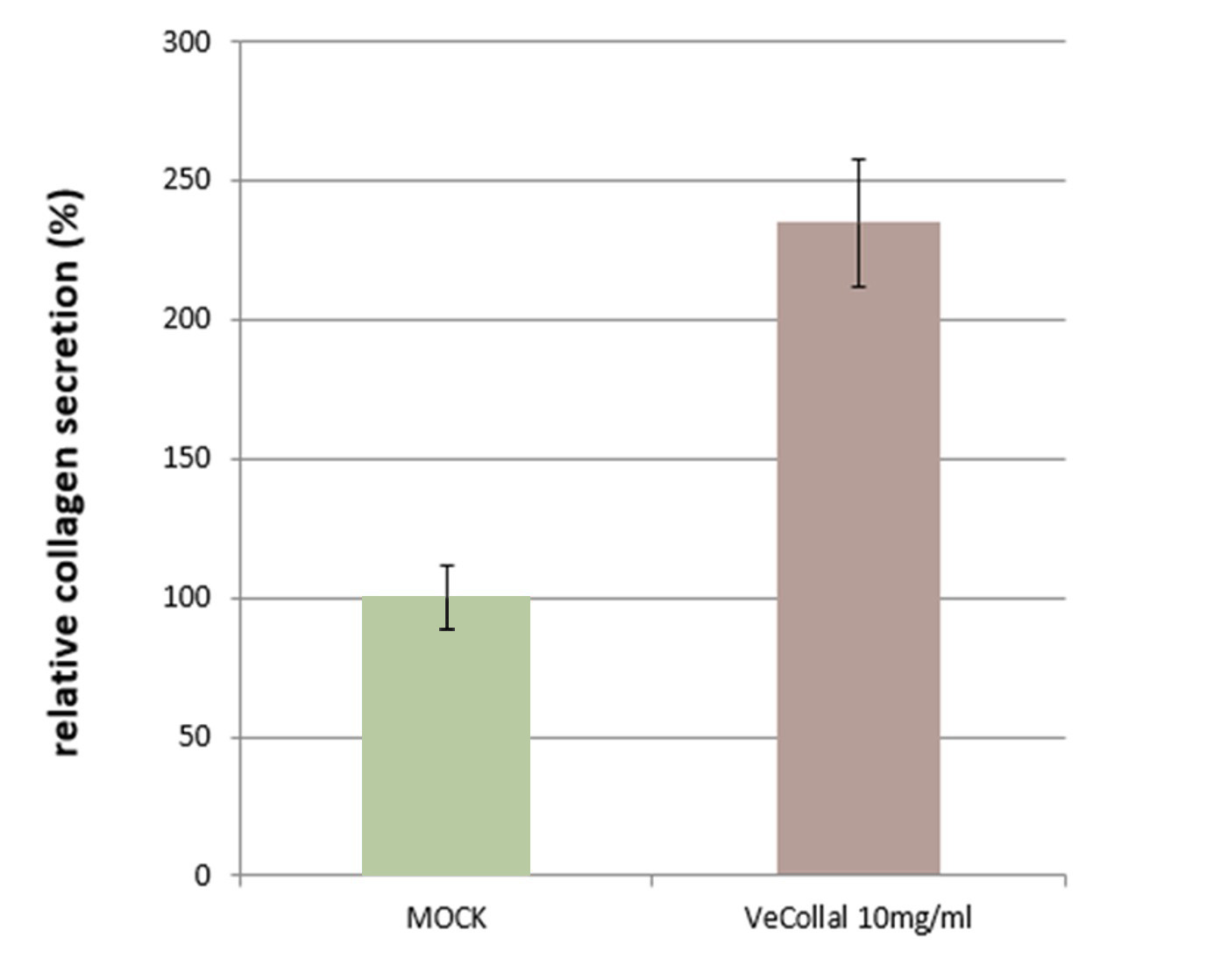
VeCollal® has been proven, with in vitro research, that it can stimulate human fibroblast cells to secrete collagen by 134.97 %
Human skin fibroblasts were used (the main cell types involved in collagen synthesis).
Different concentrations of VeCollal® were tested in the culture medium and compared against the collagen expressed with cells without treatment (MOCK).
Our results showed that the VeCollal® formulation, at a concentration of 10 mg/ml, induces the synthesis of new collagen in the cells.

Clinical Efficacy Evaluation, in vivo
Preface: The aim of the study is to evaluate the effectiveness of VeCollal® on skin beauty.
→ Sample: VeCollal® sachet (3.885 g/sachet)
- Placebo sachet
- Dosage: 1 sachet/day
→ Subjects: Total 15 adults (VeCollal® : Placebo = 10 : 5), aged 25-65 years old
→ Method: A placebo-controlled trial was conducted The subjects were informed to consume 1 sachet of the VeCollal® or placebo everyday for 4 weeks. Each subject was required to undergo skin condition measurement and blood sampling at week 0, week 2, and week 4.
→ Test item:
- Skin wrinkles
- Skin collagen density
VeCollal® has potential to reduce wrinkles
and to boost collagen synthesis
After consuming VeCollal® sachet for 4 weeks, the average value of wrinkles was 12.5 % lower than first week. The ratio of the subjects who had an effective improvement to the total participants was 80.0 %.
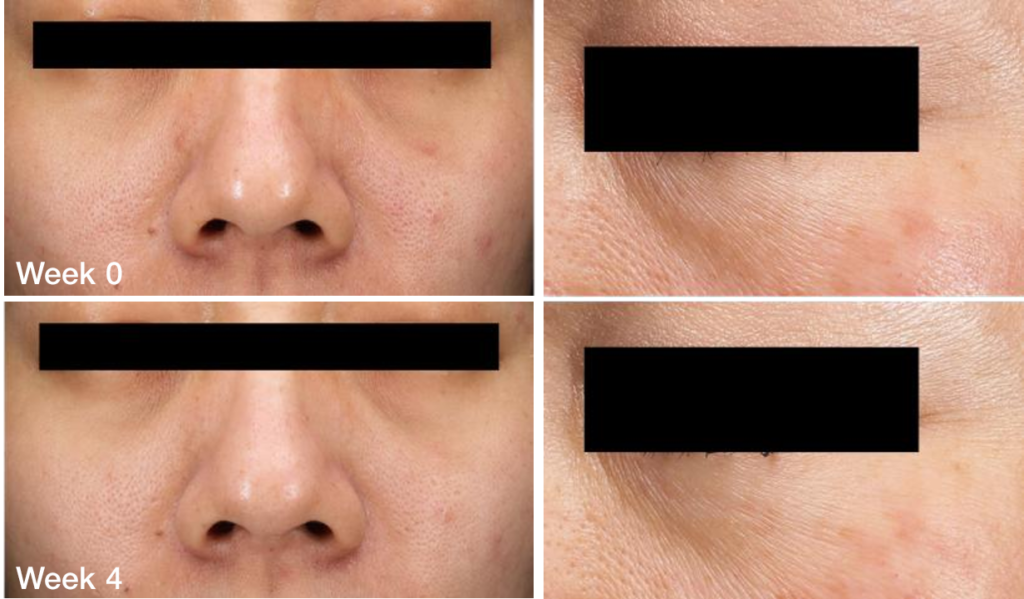
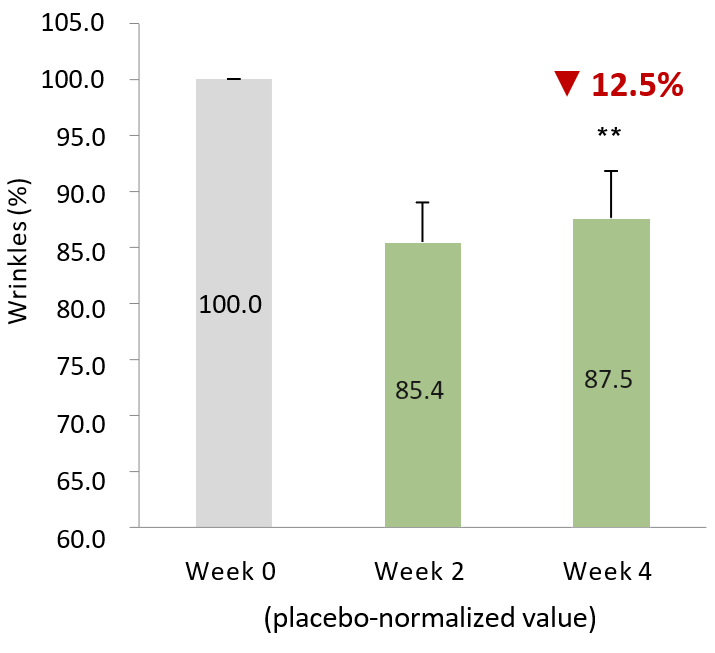
The measured collagen density of the skin has increased by an average of 4.7 %.
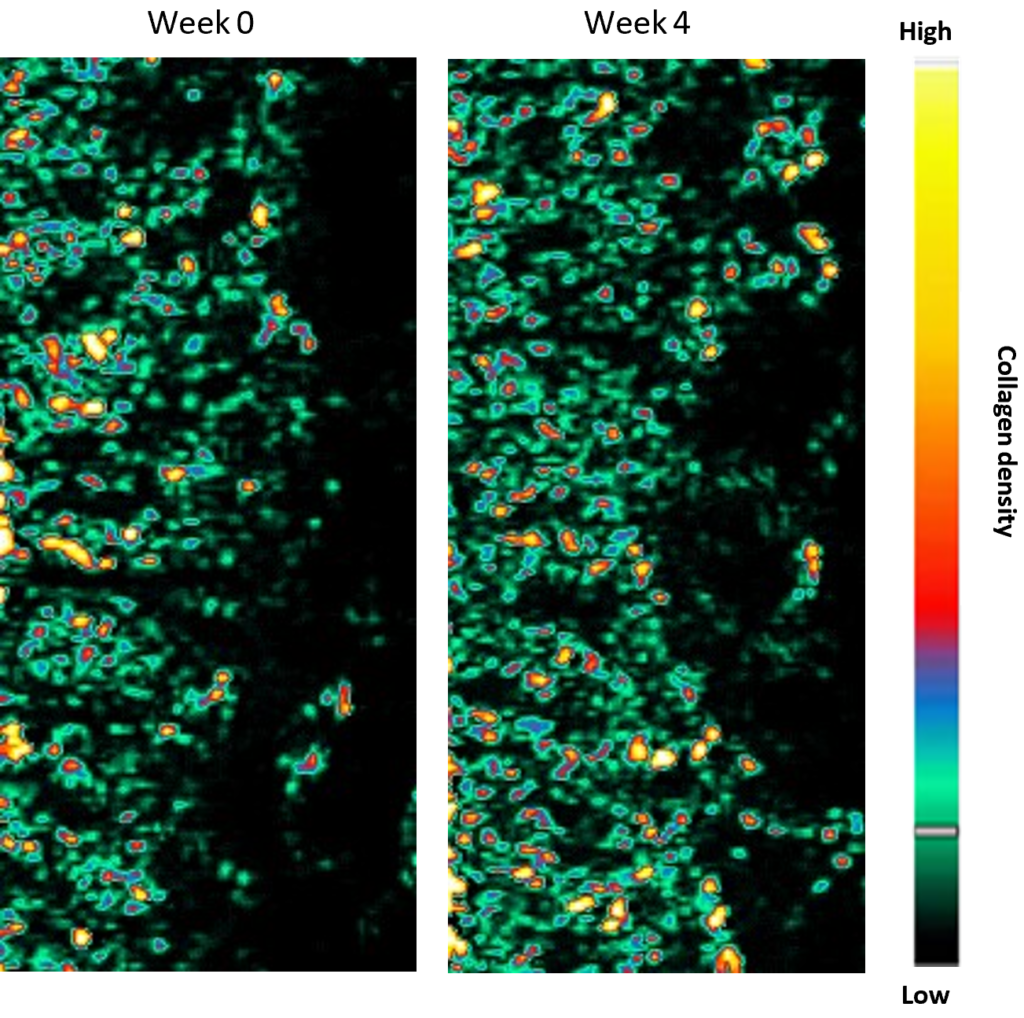
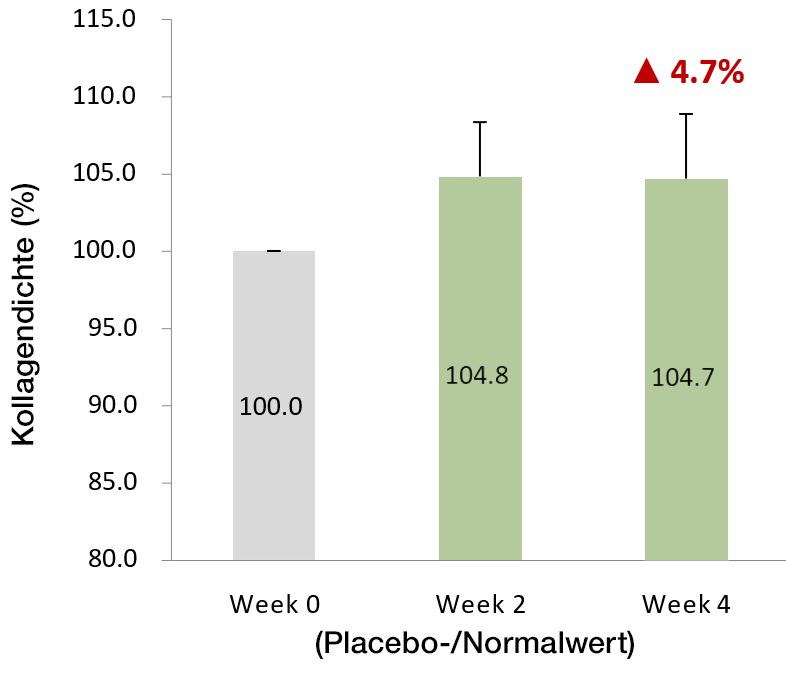
Hyaluroic acid
The hydration level of skin is the young feature. As the years of age increase, the water will gradually lose, slowly losing firmness and tenderness. Hyaluronan is a glycosaminoglycan, a natural moisturizing factor for the skin, and is widely found in the connective tissue of the human body.
The water retention capacity of hyaluronic acid is more powerful than other natural or synthetic polymers. In fact, one gram of hyaluronic acid can hold six liters of water (six thousand times absorption)
International Journal of Toxicology, July/August 2009
→ Improves skin hydration
→ Strengthens the skin barrier
→ Improves fine lines
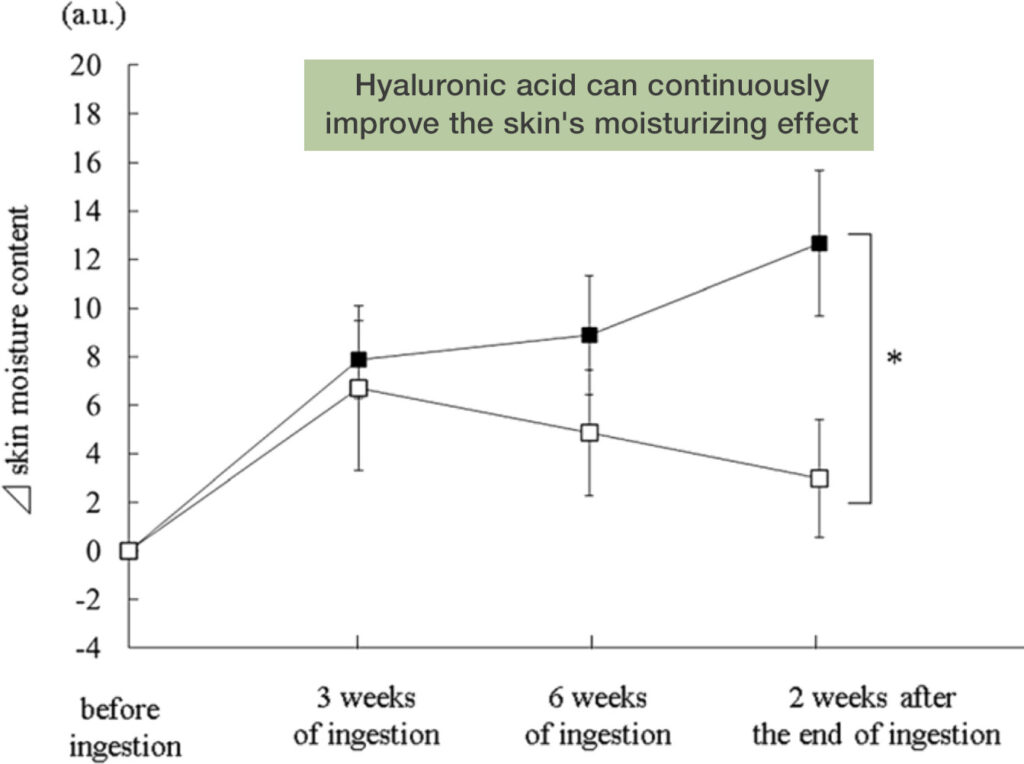
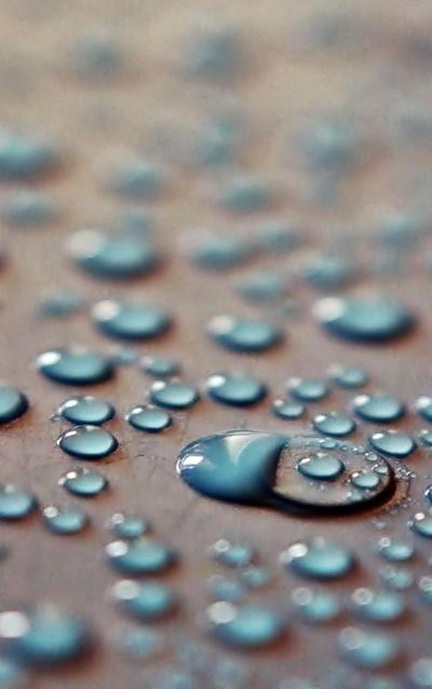
SUPPORTING STUDIES IN THE FORMULATION OF VECOLLAL®
- Avila Rodríguez, M.I., L.G. Rodriguez Barroso, and M.L. Sánchez, Collagen: A review on its sources and potential cosmetic applications. Journal of Cosmetic Dermatology, 2018. 17(1): p. 20-26.
- Czajka, A., et al., Daily oral supplementation with collagen peptides combined with vitamins and other bioactive compounds improves skin elasticity and has a beneficial effect on joint and general wellbeing. Nutrition Research, 2018. 57: p. 97-108.
- Rossert, J., C. Terraz, and S. Dupont, Regulation of type I collagen genes expression.
Nephrology Dialysis Transplantation, 2000. 15(suppl_6): p. 66-68.
- Davison-Kotler, E., W.S. Marshall, and E. García-Gareta, Sources of collagen for biomaterials in skin wound healing. Bioengineering, 2019. 6(3): p. 56.
- Canty, E.G. and K.E. Kadler, Procollagen trafficking, processing and fibrillogenesis.
Journal of cell science, 2005. 118(7): p. 1341-1353.
- Tang, M., et al., Effect of Hydroxylysine-O-glycosylation on the structure of type I collagen molecule: A computational study. Glycobiology, 2020.
- Silvipriya, K., et al., Collagen: Animal sources and biomedical application. Journal of Applied Pharmaceutical Science, 2015. 5(3): p. 123-127.
- Lestari, W., et al., Plant-Based Substitutes for Gelatin, in Contemporary Management and Science Issues in the Halal Industry. 2019, Springer. p. 319-322.
- Oesser, S., et al., Oral administration of 14C labeled gelatin hydrolysate leads to an accumulation of radioactivity in cartilage of mice (C57/BL). The Journal of nutrition, 1999. 129(10): p. 1891-1895.
- Watanabe-Kamiyama, M., et al., Absorption and effectiveness of orally administered low molecular weight collagen hydrolysate in rats. Journal of agricultural and food chemistry, 2010. 58(2): p. 835-841.
- Alcock, R., et al., Plasma amino acid concentrations after the ingestion of dairy and collagen proteins, in healthy active males. Frontiers in nutrition, 2019. 6: p. 163.
- de Paz-Lugo, P., J.A. Lupiáñez, and E. Meléndez-Hevia, High glycine concentration increases collagen synthesis by articular chondrocytes in vitro: acute glycine deficiency could be an important cause of osteoarthritis. Amino Acids, 2018. 50(10): p. 1357- 1365.
- Murakami, H., et al., Importance of amino acid composition to improve skin collagen protein synthesis rates in UV-irradiated mice. Amino Acids, 2012. 42(6): p. 2481-2489.
- Aoki, M., et al., Increasing effect of an oral intake of L-hydroxyproline on the soluble collagen content of skin and collagen fragments in rat serum. Bioscience, biotechnology, and biochemistry, 2012. 76(6): p. 1242-1244.
- Schwarz, R., R. Mandell, and M. Bissell, Ascorbate induction of collagen synthesis as a means for elucidating a mechanism of quantitative control of tissue-specific function. Molecular and cellular biology, 1981. 1(9): p. 843-853.
- Pinnell, S.R., S. Murad, and D. Darr, Induction of collagen synthesis by ascorbic acid: a possible mechanism. Archives of dermatology, 1987. 123(12): p. 1684-1686.
- Lee, J., et al., Panax ginseng induces human Type I collagen synthesis through activation of Smad signaling. Journal of ethnopharmacology, 2007. 109(1): p. 29-34.
- Lee, J., et al., Asiaticoside induces human collagen I synthesis through TGFβ receptor I kinase (TβRI kinase)-independent Smad signaling. Planta medica, 2006. 72(04): p. 324- 328.
- Kim, S.-H., Method for stimulation collagen synthesis and/or KGF expression. 2010, Google Patents.
- Schneider, L.M., D.J. Pusateri, and T.Q. La, Compositions and methods for stimulating synthesis of pro-collagen or collagen and hyaluronic acid. 2010, Google Patents.
- Murakami, H. and H. Kobayashi, Amino acid composition promoting collagen synthesis. 2010, Google Patents.
- Chotphruethipong, L., R.E. Aluko, and S. Benjakul, Hydrolyzed collagen from porcine lipase-defatted seabass skin: Antioxidant, fibroblast cell proliferation, and collagen production activities. Journal of Food Biochemistry, 2019. 43(5): p. e12825.
- Bellon, G., et al., Glutamine increases collagen gene transcription in cultured human fibroblasts. Biochimica et Biophysica Acta (BBA)-Molecular Cell Research, 1995. 1268(3): p. 311-323.
- Hamanaka, R.B., et al., Glutamine metabolism is required for collagen protein synthesis in lung fibroblasts. American journal of respiratory cell and molecular biology, 2019. 61(5): p. 597-606.
- Portu, J., et al., Amino acid content in red wines obtained from grapevine nitrogen foliar treatments: consumption during the alcoholic fermentation. Wine Studies, 2014. 3(1).
- Benjakul, S., S. Karnjanapratum, and W. Visessanguan, Hydrolysed collagen from Lates calcarifer skin: Its acute toxicity and impact on cell proliferation and collagen production of fibroblasts. International Journal of Food Science & Technology, 2018. 53(8): p. 1871-1879.
- Vázquez, J.J. and E.S.M. Martínez, Collagen and elastin scaffold by electrospinning for skin tissue engineering applications. Journal of Materials Research, 2019. 34(16): p. 2819-2827.
- Lin, P.-S., et al., Transforming growth factor beta 1 increases collagen content, and stimulates procollagen I and tissue inhibitor of metalloproteinase-1 production of dental pulp cells: Role of MEK/ERK and activin receptor-like kinase-5/Smad signaling. Journal of the Formosan Medical Association, 2017. 116(5): p. 351-358.
- Zague, V., et al., Collagen hydrolysate intake increases skin collagen expression and suppresses matrix metalloproteinase 2 activity. Journal of medicinal food, 2011. 14(6): p. 618-624.
- Proksch, E., et al., Oral intake of specific bioactive collagen peptides reduces skin wrinkles and increases dermal matrix synthesis. Skin pharmacology and physiology, 2014. 27(3): p. 113-119.
- Garg, C., Molecular mechanisms of skin photoaging and plant inhibitors. International Journal of Green Pharmacy (IJGP), 2017. 11(02).
- Gref, R., et al., Vitamin c–squalene bioconjugate promotes epidermal thickening and collagen production in human skin. Scientific Reports, 2020. 10(1): p. 1-12.
- Pinnell, S.R., S. Murad, and D. Darr, Induction of collagen synthesis by ascorbic acid: a possible mechanism. Archives of dermatology, 1987. 123(12): p. 1684-1686.
- Bolke, L., et al., A collagen supplement improves skin hydration, elasticity, roughness, and density: Results of a randomized, placebo-controlled, blind study. Nutrients, 2019. 11(10): p. 2494.
- Choi, S.Y., et al., Effects of collagen tripeptide supplement on skin properties: A prospective, randomized, controlled study. Journal of Cosmetic and Laser Therapy, 2014. 16(3): p. 132-137.
- Park, K.-Y. and J. Kim, Synthesis and Biological Evaluation of Ascorbyl-Conjugated Peptide Derivatives as Collagen Synthesis Stimulating Agents in Human Skin Fibroblasts. International Journal of Peptide Research and Therapeutics, 2020: p. 1-8.
- Chen, X., et al., Panax ginseng total protein promotes proliferation and secretion of collagen in NIH/3T3 cells by activating extracellular signal-related kinase pathway. Journal of Ginseng Research, 2017. 41(3): p. 411-418.
- Lee, R., et al., Ginseng gintonin enhances hyaluronic acid and collagen release from human dermal fibroblasts through lysophosphatidic acid receptor interaction. Molecules, 2019. 24(24): p. 4438.
- Lee, G.Y., et al., Effects of Panax ginseng extract on human dermal fibroblast proliferation and collagen synthesis. International wound journal, 2016. 13: p. 42-46.
- Lu, L., et al., Asiaticoside induction for cell‐cycle progression, proliferation and collagen synthesis in human dermal fibroblasts. International Journal of Dermatology, 2004. 43(11): p. 801-807.
- Nowwarote, N., et al., Asiaticoside induces type I collagen synthesis and osteogenic differentiation in human periodontal ligament cells. Phytotherapy Research, 2013. 27(3): p. 457-462.
- Paocharoen, V., The efficacy and side effects of oral Centella asiatica extract for wound healing promotion in diabetic wound patients. J Med Assoc Thai, 2010. 93(Suppl 7): p. S166-S170.
- 1. Garg, C., Molecular mechanisms of skin photoaging and plant inhibitors. International Journal of Green Pharmacy (IJGP), 2017. 11(02).
- 2. Gref, R., et al., Vitamin c–squalene bioconjugate promotes epidermal thickening and collagen production in human skin. Scientific Reports, 2020. 10(1): p. 1-12.
- 3. Pinnell, S.R., S. Murad, and D. Darr, Induction of collagen synthesis by ascorbic acid: a possible mechanism. Archives of dermatology, 1987. 123(12): p. 1684-1686.
- 4. Bolke, L., et al., A collagen supplement improves skin hydration, elasticity, roughness, and density: Results of a randomized, placebo-controlled, blind study. Nutrients, 2019. 11(10): p. 2494.
- 5. Choi, S.Y., et al., Effects of collagen tripeptide supplement on skin properties: A prospective, randomized, controlled study. Journal of Cosmetic and Laser Therapy, 2014. 16(3): p. 132-137.
- 6. Park, K.-Y. and J. Kim, Synthesis and Biological Evaluation of Ascorbyl-Conjugated Peptide Derivatives as Collagen Synthesis Stimulating Agents in Human Skin Fibroblasts. International Journal of Peptide Research and Therapeutics, 2020: p. 1-8.
- 7. Chen, X., et al., Panax ginseng total protein promotes proliferation and secretion of collagen in NIH/3T3 cells by activating extracellular signal-related kinase pathway. Journal of Ginseng Research, 2017. 41(3): p. 411-418.
- 8. Lee, R., et al., Ginseng gintonin enhances hyaluronic acid and collagen release from human dermal fibroblasts through lysophosphatidic acid receptor interaction. Molecules, 2019. 24(24): p. 4438.
- 9. Lee, G.Y., et al., Effects of Panax ginseng extract on human dermal fibroblast proliferation and collagen synthesis. International wound journal, 2016. 13: p. 42-46.
- 10. Lu, L., et al., Asiaticoside induction for cell‐cycle progression, proliferation and collagen synthesis in human dermal fibroblasts. International Journal of Dermatology, 2004. 43(11): p. 801-807.
- Nowwarote, N., et al., Asiaticoside induces type I collagen synthesis and osteogenic differentiation in human periodontal ligament cells. Phytotherapy Research, 2013. 27(3): p. 457-462.
- Paocharoen, V., The efficacy and side effects of oral Centella asiatica extract for wound healing promotion in diabetic wound patients. J Med Assoc Thai, 2010. 93(Suppl 7): p. S166-S170.
- Benjakul, S., S. Karnjanapratum, and W. Visessanguan, Hydrolysed collagen from Lates calcarifer skin: Its acute toxicity and impact on cell proliferation and collagen production of fibroblasts. International Journal of Food Science & Technology, 2018. 53(8): p. 1871-1879.
56 . Lee, J., et al., Asiaticoside induces human collagen I synthesis through TGFβ receptor I kinase (TβRI kinase)-independent Smad signaling. Planta medica, 2006. 72(04): p. 324-328.
- Chen, X., et al., Panax ginseng total protein promotes proliferation and secretion of collagen in NIH/3T3 cells by activating extracellular signal-related kinase pathway. Journal of Ginseng Research, 2017. 41(3): p. 411-418.
- Watanabe-Kamiyama, M., et al., Absorption and effectiveness of orally administered low molecular weight collagen hydrolysate in rats. Journal of agricultural and food chemistry, 2010. 58(2): p. 835-841.
- Osawa, Y., et al., Absorption and metabolism of orally administered collagen hydrolysates evaluated by the vascularly perfused rat intestine and liver in situ. Biomedical Research, 2018. 39(1): p. 1-11.
- Lee, H.-J., et al., Orally administered collagen peptide protects against UVB-induced skin aging through the absorption of dipeptide forms, Gly-Pro and Pro-Hyp. Bioscience, biotechnology, and biochemistry, 2019. 83(6): p. 1146-1156.
- Li, P. and G. Wu, Roles of dietary glycine, proline, and hydroxyproline in collagen synthesis and animal growth. Amino acids, 2018. 50(1): p. 29-38.
- Wang, W., et al., Glycine metabolism in animals and humans: implications for nutrition and health. Amino acids, 2013. 45(3): p. 463-477.
- Karna, E., et al., Proline-dependent regulation of collagen metabolism. Cellular and Molecular Life Sciences, 2020. 77(10): p. 1911-1918.
64.. Wu, Z., et al., Metabolism, nutrition, and redox signaling of hydroxyproline. Antioxidants & redox signaling, 2019. 30(4): p. 674-682.
- Callejas, A.C.M.M., Understanding bioidentical hormones and their effect on quality of life. Journal of Prescribing Practice, 2020. 2(1): p. 18-22.
- Razzak, M. and J.K. De Brabander, Lessons and revelations from biomimetic syntheses. Nature chemical biology, 2011. 7(12): p. 865-875.
- Sharma, S., R. Gupta, and S.C. Thakur, Attenuation of collagen induced arthritis by Centella asiatica methanol fraction via modulation of cytokines and oxidative stress. Biomedical and Environmental Sciences, 2014. 27(12): p. 926-938.
- Sabaragamuwa, R., C.O. Perera, and B. Fedrizzi, Centella asiatica (Gotu kola) as a neuroprotectant and its potential role in healthy ageing. Trends in Food Science & Technology, 2018. 79: p. 88-97.
- Tsoukalas, D., et al., Discovery of potent telomerase activators: Unfolding new therapeutic and anti-aging perspectives. Molecular medicine reports, 2019. 20(4): p. 3701-3708.
- Riaz, M., et al., Ginseng: A dietary supplement as immune-modulator in various diseases. Trends in food science & technology, 2019. 83: p. 12-30. 71. Shin, H.-J., et al., Preventive effects of Korean red ginseng on experimentally induced colitis and colon carcinogenesis. Journal of Traditional and Complementary Medicine, 2020. 10(3): p. 198-206.
- Ma, G.-D., et al., Changbai Mountain ginseng (Panax ginseng CA Mey) extract supplementation improves exercise performance and energy utilization and decreases fatigue-associated parameters in mice. Molecules, 2017. 22(2): p. 237.
- Benito-Ruiz, P., et al., A randomized controlled trial on the efficacy and safety of a food ingredient, collagen hydrolysate, for improving joint comfort. International journal of food sciences and nutrition, 2009. 60(sup2): p. 99-113.
- Bosman, F.T. and I. Stamenkovic, Functional structure and composition of the extracellular matrix. The Journal of Pathology: A Journal of the Pathological Society of Great Britain and Ireland, 2003. 200(4): p. 423-428.
- Jeong, S.Y., et al., Identification of the Phytochemical Compounds and Their Type I Procollagen Induction in Astragalus membranaceus Sprouts Grown under Different Light Conditions. Journal of Applied Pharmaceutical Science, 2018. 8(06): p. 001-007.
- Sadiq, A., et al., Effects of essential amino acid “Tryptophan” in post burn skin wound healing. International Journal of Biosciences, 2018: p. 147-153.
- Friedman, M., Analysis, nutrition, and health benefits of tryptophan. International Journal of Tryptophan Research, 2018. 11: p. 1178646918802282.
78.. Skov, K., et al., Enzymatic hydrolysis of a collagen hydrolysate enhances postprandial absorption rate—A randomized controlled trial. Nutrients, 2019. 11(5): p. 1064.
- Gropper, S.S. and P.B. Acosta, Effect of simultaneous ingestion of l‐amino acids and whole protein on plasma amino acid and urea nitrogen concentrations in humans. Journal of Parenteral and Enteral Nutrition, 1991. 15(1): p. 48-53.
- Nakayama, K., C. Sanbongi, and S. Ikegami, Effects of whey protein hydrolysate ingestion on postprandial aminoacidemia compared with a free amino acid mixture in young men. Nutrients, 2018. 10(4): p. 507.
- Han, B. and M.E. Nimni, Transdermal delivery of amino acids and antioxidants enhance collagen synthesis: in vivo and in vitro studies. Connective tissue research, 2005. 46(4-5): p. 251-257.
- Kwon, Y.W., et al., N-acetylated proline-glycine-proline accelerates cutaneous wound healing and neovascularization by human endothelial progenitor cells. Scientific reports, 2017. 7(1): p. 1-13.
- Corsetti, G., et al., Topical application of dressing with amino acids improves cutaneous wound healing in aged rats. Acta histochemica, 2010. 112(5): p. 497-507.
- Al-Niaimi, F. and N.Y.Z. Chiang, Topical vitamin C and the skin: mechanisms of action and clinical applications. The Journal of clinical and aesthetic dermatology, 2017. 10(7): p. 14.
- Pullar, J.M., A.C. Carr, and M. Vissers, The roles of vitamin C in skin health. Nutrients, 2017. 9(8): p. 866.
86.. Escobar, S., et al., Effectiveness of a formulation containing peptides and vitamin C in treating signs of facial ageing: three clinical studies. International Journal of Cosmetic Science, 2021. 43(2): p. 131-135.
- Venesia, N.F., E. Fachrial, and I.N.E. Lister, Effectiveness Test of Centella Asiatica Extract on Improvement of Collagen and Hydration in Female White Rat (Rattus Norwegicus Wistar) . American Scientific Research Journal for Engineering, Technology, and Sciences (ASRJETS), 2020. 65(1): p. 98-88. Hwang, E., et al, Efficacy and safety of enzyme-modified Panax ginseng for anti-wrinkle therapy in healthy skin: a single-center, randomized, double-blind, placebo-controlled study . Rejuvenation research, 2015. 18(5): p. 449-457.
- Ammala, A., Biodegradable polymers as encapsulation materials for cosmetics and personal care markets. International journal of cosmetic science, 2013. 35(2): p. 113-124.
FREQUENTLY ASKED QUESTIONS
About Collagen:
Collagen is the most abundant structural protein in the body. It is formed of building blocks called amino acids in a specific sequence and form. You can think of collagen of the glue that holds everything together and gives strength to tissues such as skin, bones, cartilage,…
Our skin notably consists of up to 70% of collagen of a certain type – Type-1. It is this collagen that gives skin its firmness and plumpness.
Yes. There has been considerable research in the effects of collagen supplementation (for instance https://pubmed.ncbi.nlm.nih.gov/26362110/). The commercial success of collagen supplements is also testimony to the effectiveness, as the trend would quickly die if no positive results were observed. VeCollal® was based on over 70 independent studies and its efficacy has been proven in 4 clinical trials to date.
Yes – providing the supplement is of high quality. Unfortunately, a recent study from the Clean Label organisation highlighted the potential presence of heavy metals in animal sourced collagen supplements. https://cleanlabelproject.org/collagen-study-infographic/.
The consumer should realize hides and bones contain heavy metals and high-quality production is necessary to ensure safe levels. Look for products from reputable brands, containing branded ingredients like HIGH COLLAGEN®. HIGH COLLAGEN® is made from high-quality raw materials that are free of heavy metals. Each batch used is carefully controlled and analyzed.
Nothing dramatic, but your body returns to its old level of regeneration and gradually shows signs
of ageing again.
Animal collagen is very hard to digest for a human, that is why animal collagen supplements are usually collagen peptides. Which simply put, this means the big collagen molecule has been cut into smaller pieces for easier absorption. These peptides are combinations of building blocks called amino acids. The body will digest the peptides and break them down into amino acids needed to help build collagen.
ABOUT HIGH COLLAGEN Vegan Boost®:
VeCollal® is a vegan biomimetic of human Collagen type-1. That sounds complicated, but what it means is that it has the exact same amino acid profile as human Collagen type-1 – this is what makes up most of the collagen in your skin and bones.
Collagen has certain building blocks (amino acids) in a specific ratio.
VeCollal® has the exact ratio as the collagen in human skin. This is unique, as animal collagen is similar to human collagen however, it is not identical. It even lacks some of the building blocks that are essential to humans (such as an amino acid called L-Tryptophan). VeCollal® brings the human body the perfect supply of building blocks to create new collagen. However, just having the building blocks is not enough to build effectively. For example, if we want to build a house, having the bricks alone doesn’t build the house, for that, you need instructions. That is why the patent pending VeCollal® ingredient also contains powerful herbal extracts that stimulate the body to use the bricks to start building. VeCollal® in essence uses the body’s own biochemistry
to replenish collagen.
Collagen supplements are hugely popular, but the modern consumer is -thankfully- more and more concerned with sustainability and animal wellbeing. This is clearly demonstrated in the number of plant-based products growing on the market and sustainability efforts worldwide.
VeCollal® was created to answer the demand of the modern consumer who values sustainability, is vegan or vegetarian but still is unwilling to compromise on results.
No, it is a Vegan Collagen alternative. Meaning, it offers the body all the benefits of animal collagen in a sustainable animal friendly
way.
In one word: the science. Unfortunately, there are many products on the market that call themselves
vegan collagen, for which there is no scientific evidence and which are not
clinically proven. VeCollal® is different. Our formulation was created by collagen expert Dr. Jimenez, based on 70+ supporting studies, but we did not stop there. VeCollal® has been put through 4 clinical trials to date, always showing excellent results in real people. This is not simply a
self-assessment by the sponsored test subjects. High-tech equipment is used to measure wrinkles,
collagen density, hydration etc. in a scientifically sound procedure. Our
most recent clinical study was conducted by an independent medical institution.
The results of our latest clinical study are consistent with the results of similar studies conducted with animal collagen supplements. HIGH COLLAGEN Vegan Boost® with VeCollal® appears to achieve similar results, but in a shorter period of time (4 weeks), which we believe is due to the very high absorption capacity of VeCollal®, whose molecular size is 10 to 50 times smaller than that of collagen peptides.
VeCollal® delivers convincing results in just 4 weeks:
- 14.1% reduction in wrinkles
- 13.9% increase in collagen density
- 7.4% increase in skin hydration
- 16.3% reduction of skin redness
- 15.8% reduction in skin roughness
During the clinical trial, blood values and gastrointestinal discomfort were monitored – no side effects of any type were reported.
It’s calculated that the carbon footprint to make VeCollal® is 6.6 times less than when manufacturing animal based collagen. In addition, the manufacturing of VeCollal® is in a carbon neutral facility. But that’s not all, we also offset our CO2
footprint during transportation by planting trees
together with our partner Trees for All. We donate to tree planting projects. These projects not only support the
planting of new trees in Europe, but also in Madagascar. Help restore
endemic forests, endangered plant and animal species and support the
local community.